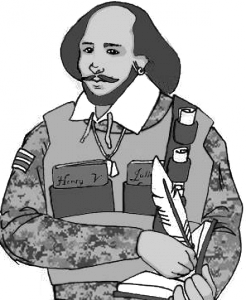Feast of Crispian’s storytelling performance is just about to open!
Whiskey, Tango, Foxtrot (Get it? Be aware that your casual usage of military acronyms might be a little more salty than you know!)
Feast of Crispian’s mission is focused on offering military veterans an opportunity to explore emotions, relationships, and post traumatic growth in the safer space of imagination and scripted dialogue. That’s the main thing; expression, being seen and heard, and connecting with, and telling your trauma stories to a caring, non-judgmental community.
Those of you who are fans of Feast rather than participants, however, probably know us for our public performances. We bring you Shakespeare with a military theme, or Shakespeare-laced plays about the life and challenges of being a veteran to Wisconsin audiences. Serious stuff. Through the eleven years of this inspiring work, Feast veterans have shared stories about some of the hardest times and experiences of their lives. They have also shared stories of a more light-hearted nature, surprising stories of military culture and adjusting after service, and stories that make us wonder at the strategies of the “brass” (WTF?!) These stories didn’t fit in the larger themes of Feast’s usual productions but needed to be shared!
Nothing we do is without an understanding of the therapeutic value of the work. If it isn’t worthwhile for the veterans participating, it won’t be a part of our process. Our highly skilled and informed faculty have a robust understanding of what elements of our process do the most good – that make life better for our veterans. The preparation for WTF brought a new element into focus and one we hope to incorporate more regularly and more widely.
Over nearly a year of formal story collecting, a group of over 20 veterans became reliable members of the circle. Bill, Jim, and I expect variations in attendance numbers and instability of members, but now we found ourselves adding chairs and welcoming a predictable group week after week. Starting with simple prompts to encourage the free flow of stories, we not only got wonderful stories, but listened to the domino effect of certain stories drawing out more stories from others, the often raucous cross-talk, and the belly-laughs. While many of the stories were ones that had been previously shared, other never-before-told stories and new-to-us stories held the room in rapt silence. At the end of these sessions, the energy was high and joyous. The project team began to look at ways we could break up performances to include these numbers without asking the audiences to sit for hours. Then it was time to begin to pick stories, shape the performance, and practice storytelling technique to more fully engage audiences. The circle fell to numbers we usually anticipate with a public show. For the others, it was camaraderie and the chance to remember that had brought them back week after week.
Audiences will hear some truly wonderful stories and the men who have workshopped, rehearsed, and practiced their stories have learned and grown as performers. They will enjoy the spontaneous feedback from listeners and the applause.
Behind the scenes, we at feast will plan to make more regular storytelling circles a part of our core work.
Veterans are not a monolith. They have many differences of opinion in all the usual human experiences. Many veterans are grateful for and proud of their military service. Others feel confused and betrayed by what was asked of them in the name of service. All veterans dearly miss the close unit camaraderie they had while training and carrying out their duties in the military. When they return to civilian life, many veterans struggle to find that sense of belonging and security. It’s not that the faculty of Feast has discounted reestablishing camaraderie in our process – building community is a powerful part of our mission, and stories outside of the scripted ones have always been welcomed. I still believe that, first and foremost, emotional expression must be normalized for healthy and successful relationships with family and community. But this project has illuminated a next step for getting closer to the ideal of community. What once was our people, sitting around a fire, everyone’s voice equally welcomed, and the pleasure of stories shared has turned into texts and screens. That’s a broad generalization but what it illustrates is the complexity of gathering when we live so far apart and have so many distractions. This is a growing problem in every level of our American society and can be seen in the epidemic of loneliness and despair. We all need to sit on a circle and tell and listen to stories.
Next week, come and hear a handful of funny, heartful, and surprising stories from these wonderful veterans. If you are a veteran, bring your stories too. We will be hosting more gathering opportunities for veterans.
Dear readers, a missing part of this article is an important part of the circle camaraderie, storytelling itself. The next FoC blog will go into a discussion of what are stories, why are they so important, and maybe some of the things we learned about affective storytelling from our expert friend, Robin Mello, storyteller and storytelling teacher.
Stay tuned!
Peace – Nancy Smith-Watson
Whiskey, Tango, Foxtrot – Before, Between, and Beyond the Battlefield would not be possible without generous support from Wisconsin Arts Board, the National Endowment for the Arts, and the Schoen Family Charitable Trust.














